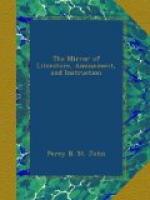W.G.C.
* * * * *
SUMPTUARY LAWS.
These laws were made to restrain excess in apparel, costly furniture, eating, &c.
Zaleucus, the ancient philosopher and legislator of Greece, ordained that no woman should go attended with more than one maid in the street, except she was drunk. He prohibited the use of wine, otherwise than as a medicine, &c.
Among the Romans there were sumptuary laws to restrain the number of guests at feasts;—not only the master of the feast, but all the guests too, were liable to the penalty. It was also enacted, that more than ten asses should not be spent at any ordinary feast. Ten asses was the price of a sheep.
Luxury was restricted in England in 1337; wherein the prelates and nobility were confined to two courses every meal, and two kinds of food in every course, except on great festivals. All who did not enjoy a fee estate of 100_l._ per annum were also prohibited from wearing furs, skins, or silk; and the use of foreign cloth was confined to the royal family alone—to all others it was prohibited. An edict was issued by Charles VI. of France, which says, “Let no one presume to treat with more than a soup and two dishes,” 1340.
Sumptuary laws were made in England, in former times, against picked shoes, short doublets, and long coats. The dandies of ancient days wore the beaks or points of their shoes so long, that they encumbered themselves in their walking, and were forced to tie them up to their knees; the fine gentlemen fastened theirs with chains of silver, or silver gilt, and others with laces. This ridiculous custom was in vogue from the year 1382; but was prohibited, on the forfeiture of 20_s._ and the pain of cursing by the clergy, 1467.
In the reign of King Henry IV., Camden says—Pride was got so much into the foot, that it was proclaimed that no man should wear shoes above six inches broad at the toes; and other garments were so short, that it was enacted, under Edward IV., that no person under the condition of a lord wear any mantle or gown, unless of such length.
P.T.W.
* * * * *




